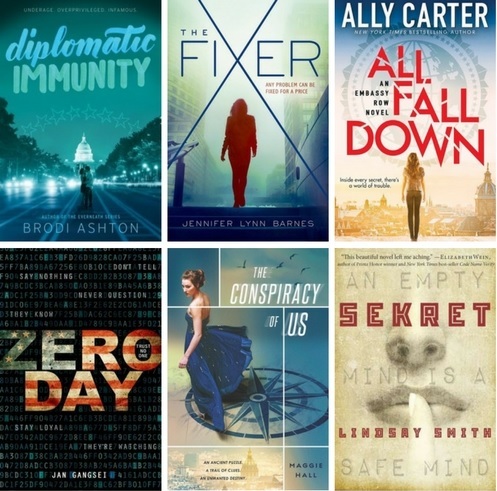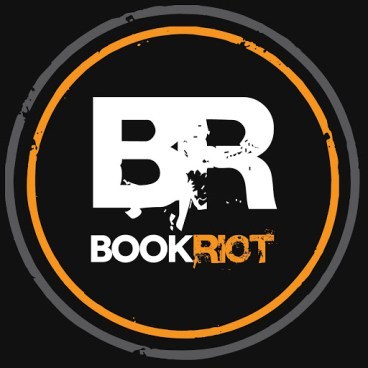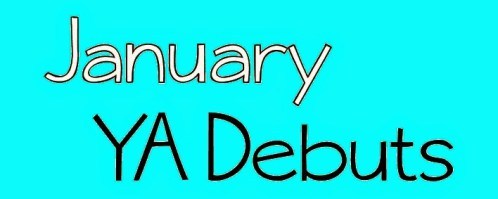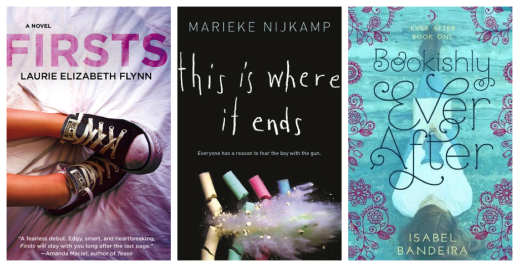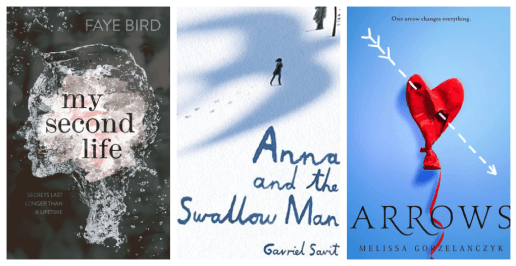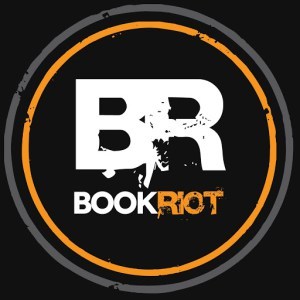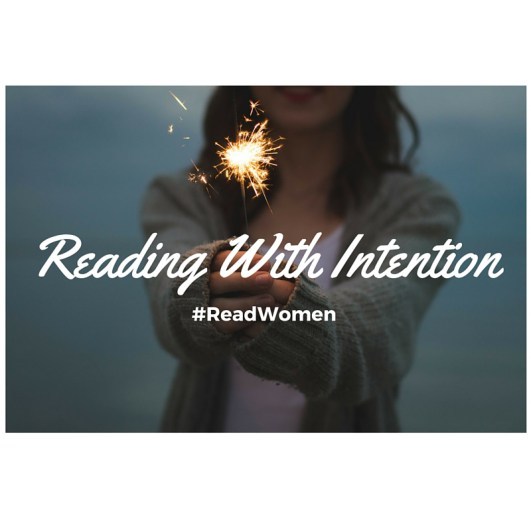Kelly Jensen's Blog, page 72
August 16, 2016
Political Thrillers for Teens: A Booklist
When I was a teen, the idea of a young adult political thriller was unknown to me. That genre belonged squarely in adult fiction, in the realm of books by people like Tom Clancy who wrote about old (read: anyone over 35) men traveling across the world to wrangle dictators or stop submarines from launching missiles. Of course, Ellen Emerson White’s series The President’s Daughter was around, but my teenage years fell squarely between the release of the third and fourth books, so they just weren’t on my radar.
In recent years, though, I’ve seen an uptick in political thrillers for the YA market. I suspect it has a bit to do with Scandal, though I’m unsure how many teens actually watch that show. Several of the books below have been marketed as “Scandal for teens.” But today’s teens are also perhaps more politically aware, at least on a surface level, than previous generations thanks to the saturation of social media, where political memes are legion and a willing audience exists for the discussion of any and every political ideology.
I’m speculating about the reasons for the rise in these sorts of novels, but I’m certain that the books on this list (four of which I’ve read myself) are treats for politically-minded teens. Though none of the protagonists are of voting age, they all find themselves involved in national or international politics in some way – their parents are diplomats or politicians, or they find themselves accidentally in possession of a dangerous piece of information. Most touch on current political events broadly (terrorism, corruption, inequality, globalization), though they also tend to stay away from more specific details, which gives them a more perennial shelf life.
Descriptions are via Worldcat.
Diplomatic Immunity by Brodi Ashton
A seventeen-year-old aspiring reporter decides to write a scathing exposé on an elite Washington, D.C., private school, but her life changes when her subject comes to her for help
The Fixer by Jennifer Lynn Barnes
When her grandfather develops dementia, sixteen-year-old Tess, who has been keeping his Montana ranch going, is whisked away to Washington, D.C., by a sister she barely knows and thrown into a world of politics, power, wealth, love triangles, and family secrets. | Sequel: The Long Game | Kimberly’s reviews
All Fall Down by Ally Carter
There are many powerful people along Embassy Row who want Grace to block out all her unpretty thoughts. But Grace will not stop until she finds out who killed her mother and make the killer pay. | Sequel: See How They Run | Kimberly’s reviews
Zero Day by Jan Gangsei
Eight years after being kidnapped Addie Webster, now sixteen, resurfaces under mysterious circumstances, significantly changed, and her childhood best friend, Darrow Fergusson, is asked by a national security advisor to spy on her to uncover whether she is a threat to her father’s Presidency or the nation.
The Conspiracy of Us by Maggie Hall
When sixteen-year-old Avery West learns her family is part of a powerful and dangerous secret society, and that her own life is in danger, she must follow a trail of clues across Europe. | Sequel: Map of Fates
Sekret by Lindsay Smith
Follows a group of psychic teenagers in 1960s Soviet Russia who are forced to use their powers to spy for the KGB. | Sequel: Skandal | Kimberly’s review
January 26, 2016
Fairest by Marissa Meyer
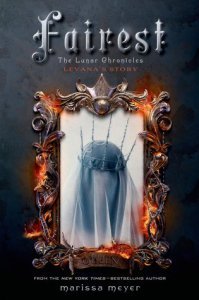 Rebecca Soler is my new favorite audiobook narrator, but only for stories with a certain kind of character – the defiant, no regrets girl who slowly moves from shades-of-gray to all bad (or nearly so). She reads Marissa Meyer’s story about Levana, the evil queen in the Lunar Chronicles series, and she does such a fantastic job that I listened to the ending twice, which gave me chills both times. She also narrated Violet in Nova Ren Suma’s The Walls Around Us, which I highly recommend on audio, in large part thanks to Soler’s narration.
Rebecca Soler is my new favorite audiobook narrator, but only for stories with a certain kind of character – the defiant, no regrets girl who slowly moves from shades-of-gray to all bad (or nearly so). She reads Marissa Meyer’s story about Levana, the evil queen in the Lunar Chronicles series, and she does such a fantastic job that I listened to the ending twice, which gave me chills both times. She also narrated Violet in Nova Ren Suma’s The Walls Around Us, which I highly recommend on audio, in large part thanks to Soler’s narration.
I was surprised by how much I liked Fairest, mainly because I’m not a big fan of short stories or novellas and I didn’t find Levana all that compelling in the series proper. But she is quite compelling here. Meyer gives her character depth that’s largely missing from the previous three novels, but not in a way that necessarily garners overwhelming sympathy. She just becomes interesting in her badness. I was able to see both how Levana became the person she is, as well as how she was, in many ways, already that person. She’s not a good person and doesn’t much care about being a good person in the first place. She’s wholly concerned with her own happiness and slowly cares less and less about how the pursuit of that happiness affects others – in part because no one else ever cared about how their actions affected her.
Soler’s narration perfectly captures this. Levana is hesitant at first, desperately wishing for love and affection, from one man in particular. It develops from a young girl’s crush into something much more sinister, moving beyond a need for love to a need for control above all, and Soler’s tone grows darker to match this change, until she reads the final line that ends Levana’s final terrible act, the aforementioned ending that gave me chills.
I was concerned that Meyer would milk Levana’s sad background to develop sympathy, but that’s not the tack she takes, for which I’m grateful. There’s definitely some sympathy there, but not so much that we can’t still root against her in Winter, or claim that she’s merely misunderstood, or isn’t responsible for her own actions. We can, she’s not, and she is. This is a fascinating read for Lunar Chronicles fans, as well as a great example of how to write an interesting villain – I hope Levana continues to be just as interesting in Winter.







 Related StoriesCybils 2015 – The Ones That Got AwayA Few Cybils Reads – Part VI (2015)Dare to Disappoint by Ozge Samanci
Related StoriesCybils 2015 – The Ones That Got AwayA Few Cybils Reads – Part VI (2015)Dare to Disappoint by Ozge Samanci
January 24, 2016
Now For Something Different!
I’m trying something new, different, and totally terrifying today. I don’t know if I’ll ever do it again, but, I wanted to give making a book talk video a spin. This is a look at me (me!) talking about my current reads and some books hitting the top of my to-be-read pile.
This video is unedited, unscripted, and 100% raw Kelly talking about books. Think stream-of-consciousness but video style.
(deep breath)
Welcome to my face and my voice after only ever reading me on a screen. I’ll link to the books below on Goodreads if you’re interested in adding to your own TBR/want a compelling reason to listen to me yammer.
My Life On The Road by Gloria Steinem
Paper Girls #2 and Paper Girls #3 by Brian K. Vaughan (I know, male author!)
Paper Girls: Volume 1 (the trade edition)
The Memory of Light by Francisco X. Stork
Gena/Finn by Hannah Moskowitz and Kat Helgeson
A Tyranny of Petticoats edited by Jessica Spotswood
Burning by Danielle Rollins







 Related StoriesJanuary 2016 Debut Young Adult NovelsYour Favorite Female-Driven Young Adult NovelsAll Things Debut YA: Morris Awards & November/December Releases
Related StoriesJanuary 2016 Debut Young Adult NovelsYour Favorite Female-Driven Young Adult NovelsAll Things Debut YA: Morris Awards & November/December Releases
January 21, 2016
This Week at Book Riot
Before diving into this week’s posts over on Book Riot, I wanted to talk about a book drive I’m coordinating. Marley Dias is an incredible 11-year-old who, after being tired of reading and being assigned books about white boys and dogs, wanted to collect 1000 black girl books for her school. She hopes to reach her goal by February 1. I thought readers might want to help out, and if you do, I’m collecting cash through paypal to send books her way. We’ve already raised $750, which will cover the cost of over 75 books, but let’s get it even higher. I’ll be collecting through Monday or Tuesday and will absolutely share the massive list of books featuring black girl leads with everyone. You can read Marley’s story and how to donate here.
Onto this week at Book Riot . . .
For this week’s “3 On A YA Theme,” I’m talking about 3 YA books perfect for fans of the show Twin Peaks. These are weird, eerie, wonderfully creepy mysterious stories.
Here’s the first quarterly round-up of YA books hitting shelves this year. There are over 175 books you should know about between January and March this year.
And in “my job is so great” news, I’m going to be writing a twice-monthly newsletter dedicated to all things young adult at Book Riot. Sign up for it here, where, if you’re a US or Canadian resident, you are also eligible to win 15 books from my mailbag. I cannot wait to get this rolling and hope you join me for the fun.







 Related StoriesThis Week at Book RiotThis Week at Book Riot (and Around The Web!)This Week at Book Riot & SLJ…
Related StoriesThis Week at Book RiotThis Week at Book Riot (and Around The Web!)This Week at Book Riot & SLJ…
January 19, 2016
Night Gardens
Frequently while paging through catalogs and reviewing book lists from vendors, I’ll notice a title that sounds familiar. The latest is “night garden” and its variations, prompted by my sighting of The Night Gardener by Terry and Eric Fan, a picture book being published by Simon & Schuster Books for Young Readers on February 16. This immediately made me think of the middle grade book by the same title by Jonathan Auxier as well as Barbara Joosse’s picture book In the Night Garden. Turns out there’s a whole host of books for kids and adults that use this phrase in its title, as you’ll see below. Descriptions are all via WorldCat.
The Night Gardener by Jonathan Auxier (middle grade fiction)
Irish orphans Molly, fourteen, and Kip, ten, travel to England to work as servants in a crumbling manor house where nothing is quite what it seems to be, and soon the siblings are confronted by a mysterious stranger and secrets of the cursed house.
The Night Gardener by Terry and Eric Fan (picture book)
Everyone on Grimloch Lane enjoys the trees and shrubs clipped into animal masterpieces after dark by the Night Gardener, but William, a lonely boy, spots the artist, follows him, and helps with his special work.
In the Night Garden by Barbara Joosse (picture book)
Three friends play in a garden and in the bath before bedtime, each one imagining herself a different animal.
Midnight in the Garden of Good and Evil by John Berendt (adult nonfiction)
In charming, beautiful, and wealthy old-South Savannah, Georgia, the local bad boy is shot dead inside of the opulent mansion of a gay antiques dealer, and a gripping trial follows.
The Night Gardener by George Pelecanos (adult fiction)
When the body of a local teenager turns up in a community garden, veteran homicide detective Gus Ramone teams up with T.C. Cook, a legendary, now retired detective, and Dan “Doc” Holiday, his former partner who left the force under a cloud of suspicion.
In the Night Garden by Catherynne M. Valente (adult fiction)
A lonely girl with a dark tattoo across her eyelids made up of words spelling out countless tales unfolds a fabulous, recursive Arabian Nights-style narrative of stories within stories in this first of a new fantasy series from Valente. The fantastic tales involve creation myths, shape-changing creatures, true love sought and thwarted, theorems of princely behavior, patricide, sea monsters, kindness and cruelty.
The Night Garden by Lisa Van Allen (adult fiction)
In the Pennywort, there is a garden of edible flowers, a garden meant for touching, and one in which the flowers only bloom at night. Since her mother’s death 5 years ago, Olivia has been carrying on her legacy, caring for Pennywort Gardens and running an informal program that provides safe haven to women in exchange for their help with the lush gardens. The townspeople hate having what they call a ‘halfway house’ around, and Olivia’s neighbors are convinced she’s using more than her allotment of water in a drought year, and keep calling the police. But Olivia has secrets of her own and needs everyone to just keep their distance.







 Related StoriesReal Life
Related StoriesReal Life
January 17, 2016
January 2016 Debut Young Adult Novels
It’s time for another round-up of debut YA novels of the month. It’s a new year, so there’s a whole new batch of titles hitting shelves. January always excites me since it also means a whole new year of brand new writers to explore.
Like always, this round-up includes debut novels, where “debut” is in its purest definition. These are first-time books by first-time authors. I’m not including books by authors who are using or have used a pseudonym in the past or those who have written in other categories (adult, middle grade, etc.) in the past.
All descriptions are from Goodreads, unless otherwise noted. If I’m missing any debuts out in January from traditional publishers — and I should clarify that indie presses are okay — let me know in the comments. As always, not all noted titles included here are necessarily endorsements for those titles.
Firsts by Laurie Elizabeth Flynn
Seventeen-year-old Mercedes Ayres has an open-door policy when it comes to her bedroom, but only if the guy fulfills a specific criteria: he has to be a virgin. Mercedes lets the boys get their awkward, fumbling first times over with, and all she asks in return is that they give their girlfriends the perfect first time- the kind Mercedes never had herself.
Keeping what goes on in her bedroom a secret has been easy- so far. Her absentee mother isn’t home nearly enough to know about Mercedes’ extracurricular activities, and her uber-religious best friend, Angela, won’t even say the word “sex” until she gets married. But Mercedes doesn’t bank on Angela’s boyfriend finding out about her services and wanting a turn- or on Zach, who likes her for who she is instead of what she can do in bed.
When Mercedes’ perfect system falls apart, she has to find a way to salvage her reputation and figure out where her heart really belongs in the process.
This is Where it Ends by Marieke Nijkamp
10:00 a.m. The auditorium doors won’t open.
10:05 Someone starts shooting.
When the NSA approaches Darrow Fergusson, Addie’s childhood best friend and the son of the president’s chief of staff, he doesn’t know what to think. How could this slip of a girl be a threat to national security? But at the risk of having his own secrets exposed by the powerful government agency, Darrow agrees to spy on Addie.
It soon becomes apparent that Addie is much more than the traumatized victim of a sick political fringe group. Addie has come with a mission. Will she choose to complete it? And what will happen if she does?
The Heir and the Spare by Emily Albright
In this modern day fairytale, Evie is on a path to figure out who her mom really was, while discovering for herself what the future will hold. Charged with her late mother’s letters, Evie embarks on a quest into her past. The first item on the list is to attend Oxford, her mom’s alma mater. There, Evie stumbles upon a real life prince charming, Edmund Stuart the second Prince of England, who is all too happy to be the counterpart to her damsel in distress.
Evie can’t resist her growing attraction to Edmund as they spend more time together trying to unravel the clues her mother left behind. But, when doubts arise as to whether or not Edmund could ever be with an untitled American, what really ends up unraveling is Evie’s heart. When Evie uncovers all the facts about her mom’s former life, she realizes her mom’s past can open doors she never dreamed possible, doors that can help her be with Edmund. But, with everything now unveiled, Evie starts to crack under the pressure of new family responsibilities and the realization that her perfect prince may want her for all the wrong reasons.
My Second Life by Faye Bird
All Imogene Scott knows of her mother is the bedtime story her father told her as a child. It’s the story of how her parents met: he, a forensic pathologist, she, a mysterious woman who came to identify a body. A woman who left Imogene and her father when she was a baby, a woman who was always possessed by a powerful loneliness, a woman who many referred to as troubled waters.
When Imogene is seventeen, her father, now a famous author of medical mysteries, strikes out in the middle of the night and doesn’t come back. Neither Imogene’s stepmother nor the police know where he could’ve gone, but Imogene is convinced he’s looking for her mother. She decides to put to use the skills she’s gleaned from a lifetime of her father’s books to track down a woman she’s never known, in order to find him and, perhaps, the answer to the question she’s carried with her for her entire life.
The Year We Fell Apart by Emily Martin
Few things come as naturally to Harper as epic mistakes. In the past year she was kicked off the swim team, earned a reputation as Carson High’s easiest hook-up, and officially became the black sheep of her family. But her worst mistake was destroying her relationship with her best friend, Declan.
Now, after two semesters of silence, Declan is home from boarding school for the summer. Everything about him is different—he’s taller, stronger…more handsome. Harper has changed, too, especially in the wake of her mom’s cancer diagnosis.
While Declan wants nothing to do with Harper, he’s still Declan, her Declan, and the only person she wants to talk to about what’s really going on. But he’s also the one person she’s lost the right to seek comfort from.
As their mutual friends and shared histories draw them together again, Harper and Declan must decide which parts of their past are still salvageable, and which parts they’ll have to let go of once and for all.







 Related StoriesAll Things Debut YA: Morris Awards & November/December ReleasesYour Favorite Female-Driven Young Adult NovelsComics and Graphic Novel/Memoir Round-Up
Related StoriesAll Things Debut YA: Morris Awards & November/December ReleasesYour Favorite Female-Driven Young Adult NovelsComics and Graphic Novel/Memoir Round-Up
January 14, 2016
This Week at Book Riot
I’m back in the game at Book Riot this week! I’ve been a writing fool, though not all of it has gone up this week. I’ll be making a really exciting Book Riot related announcement soon, too.
For this week’s “3 on a YA theme,” I asked a question: what celebrities would you LIKE to see write a YA novel? Come talk with me about your picks and read mine.
Here’s your round-up of YA book related news from December and the early part of January. This one is jam-packed.







 Related StoriesThis Week at Book RiotThis Week at Book Riot (and Around The Web!)This Week at Book Riot & SLJ…
Related StoriesThis Week at Book RiotThis Week at Book Riot (and Around The Web!)This Week at Book Riot & SLJ…
January 12, 2016
Cybils 2015 – The Ones That Got Away
A History of Glitter and Blood by Hannah Moskowitz
This book is bananas, and I mean that in the best way. It’s about a war between fairies, gnomes, and creatures called tight-ropers in which humans are completely absent, and it’s told by an unreliable narrator in such a way that you’re never quite sure what really happened – until it all begins to come together. Moskowitz took a ton of risks with this story, both in the way she chose to tell it and in its content, which is violent and at times macabre (for example, the fairies are immortal, which means that when they’re eaten by their natural predators the gnomes, they continue to feel the bits of themselves being digested). Her risks paid off. This book is utterly entrancing from beginning to end. It’s rare to see a fantasy written with this level of creativity, especially one that is so successfully executed, and I’ll be recommending it for years to come.
Lois Lane: Fallout by Gwenda Bond
Bond’s book is just plain fun. It’s about a teenage Lois Lane, who tends to get into scrapes wherever she goes, and she goes a lot of places thanks to her general father. At her new school, she’s promised to keep a low profile and stay out of trouble – but we all know that’s not going to happen. On her first day there, she witnesses a brilliant girl being bullied by a strange group of students whose behavior is eerily in sync. When the principal refuses to do anything about it, Lois decides to leverage her new job as a reporter for the Daily Scoop – the junior version of the Daily Planet – to figure out what’s really going on. The mystery is interesting and lightly flavored with science fiction. Superman makes brief cameos as Lois’ online friend SmallvilleGuy, and knowing that he’s Superman when Lois doesn’t adds to the fun. Fallout is full of action and personality, just like its main character; the comparison to Veronica Mars is apt.
Crimson Bound by Rosamund Hodge
I love Hodge’s writing and her unique way of manipulating the fairy tales we all know in interesting, and frequently dark, ways. This story, which uses elements of Little Red Riding Hood, is a bit grimmer than Cruel Beauty and lighter on romance. I wrote more about it here.
Burning Nation by Trent Reedy
Considering the recent events in Oregon, it’s accurate to say there’s no YA writer more prescient than Trent Reedy. This is the sequel to Burning Nation, which I also really liked. The audiobook makes this a standout. I wrote more about it here.







 Related StoriesA Few Cybils Reads – Part VI (2015)A Few Cybils Reads – Part IV (2015)A Few Cybils Reads – Part III (2015)
Related StoriesA Few Cybils Reads – Part VI (2015)A Few Cybils Reads – Part IV (2015)A Few Cybils Reads – Part III (2015)
January 5, 2016
Cybils 2015 Wrap-Up
In case you missed it, the 2015 Cybils finalists were announced on January 1! I had a great time helping select the shortlist for YA speculative fiction this year, and I’m proud of our high-quality, appealing, and diverse list, which includes:
An Inheritance of Ashes by Leah Bobet
Bone Gap by Laura Ruby
Mortal Heart by Robin LaFevers
Shadowshaper by Daniel Jose Older
Slasher Girls and Monster Boys edited by April Genevieve Tucholke
The Six by Mark Alpert
The Walls Around Us by Nova Ren Suma
I’ve linked each title to my review (or the Goodreads page, if I haven’t yet written a review). I wasn’t as prolific in my reading this year as I was last year, but I still made a pretty good showing! I evaluated a total of 53 books, 38 of which I read in full. As was the case last year, there were a few books that I loved but didn’t make the final cut, which I’ll discuss next week. This week, I wanted to share the final Cybils spiderweb, which I began in October when I first started reading for the season. It was interesting to see the links between each of the books and consider the recurring themes (though I wasn’t able to include all books I read, and some of the books I did include I didn’t get a chance to read). Click on the image to enlarge.







 Related StoriesA Few Cybils Reads – Part VI (2015)All Things Debut YA: Morris Awards & November/December ReleasesA Few Cybils Reads – Part V (2015)
Related StoriesA Few Cybils Reads – Part VI (2015)All Things Debut YA: Morris Awards & November/December ReleasesA Few Cybils Reads – Part V (2015)
January 3, 2016
Intentional Reading
A few years ago, I wrote about how I dislike annual reading goals. The act of setting up a number or goal in reading as a yearly resolution feels to me like making reading work, rather than an activity worth enjoying. That’s not to say there’s not value in it — for many readers, there definitely is — but for me, being intentional in my reading brings meaning to my reading life.
Intentional reading is being selective with my reading. I’ve been doing the reading thing long enough now to know what phrases or descriptions ring my bells. I also have a good sense of where I can improve in my reading and I create strategies for getting better. Over the last few years, for example, I recognized how important reading more women and more people of color was; I set the intention of only spending my money on books written by women or people of color. By setting that intention, I work hard to seek out those books, many of which I may otherwise never have discovered, and I’m surrounded by them. If I need to read a book, I have so many fantastic options in my home.
Last fall, I made a decision about my reading life. It was something I needed to do. I’d sort of hinted at needing to change things up in the summer, but I hadn’t yet figured out how to go about it or what it was that I needed to do. When your reading life and your work life are so intimately and intricately tied, it’s hard to tease one of them apart from the other and separate the things you know you should be reading for work-related reasons from those you want to read for you and only you. I love talking about books intelligently and I love being able to be part of a conversation about books that are sparking discussion within the YA and broader book community. But I’m also not, nor have I ever been, a reader who needs to be up on the latest, greatest, or big-budget titles. I rely on reviews by others of those titles to help guide my decisions on them.
I was intrigued by Annika’s post about having only read books by women since 2013. I love when people suss out patterns in their reading and then they go at those things with full force. That’s an intention. But more, when the comments on Annika’s post turned really bothersome — and I moderated those comments for a few days, so I saw some of the worst of it — I decided that taking on a similar intention in my reading would be worthwhile. Why did a woman choosing to read only women make people so angry? What is so scary about choosing to read only women?
Leila answers that question about the challenge in a way that I didn’t know how to articulate while also offering more compelling reasons for taking part in the intentional reading of women’ stories:
And, as I watched that all play out, rather than scaring me off, all of the garbage levelled at that essay—and, of course, at the woman who wrote it—resulted in the realization that this year, every single book that I’ve read that I have connected on a kindred-spirit level has been a book written by a woman. It made me realize that lately, while I haven’t felt particularly welcome in a community that I used to consider welcoming, that I have felt embraced and affirmed and heard and challenged—in a positive way—by those same authors, in those same books.
It made me realize that at the moment, I want to surround myself with women’s voices. That I want to put my energy into listening to them, engaging with them, learning from them, and amplifying them.
I began reading only women in November. Knowing my bookshelves are packed with books by women and people of color, I’ve had so many outstanding options to choose from. Sure, I’ve already missed out on reading a few books I’d been looking forward to, and I know there are more books I’m going to miss out on reading in this coming year. I’ve felt my heart sink opening up packages and finding ARCs by favorite male authors, knowing that I wouldn’t be reading them this year. But the beauty of books and reading is when you set an intention like reading only women, books written by men do not disappear. I can pick up the books I’ve been eager to read in 2017. Or 2018. Or 2019. Or 2020. It doesn’t matter. They aren’t going to vanish into the abyss; they’ll be there when I am ready to pick them up. With the way technology works, even books that might not otherwise have a long shelf life can stick around infinitely thanks to eformats. Likewise, talking about good books never gets tiring and it’s never out of style. Backlist discussions matter as much as, if not even more than, talking about titles the weeks leading up to or immediately after their release dates.
By intentionally limiting the books I’m reading, I’m discovering how my reading is expanding. It seems counterintuitive, but now, rather than sticking to a certain type or genre of book, I’m reaching a little further. I’m excited to read more memoirs by women. I’ve always wanted to do that, but with the intention of reading only women, now I am permitting myself to reach for those books when I may have otherwise kept pushing them off in exchange for something else more timely or more related to what I feel like I should be talking about. I’m thinking about the connections between those books and my own life. Those books and the lives of other women I care about. Those books and teenagers, both those who may be intrigued by the book at hand or those who might find themselves connecting on a personal level to those stories in the future.
My reading has slowed down a bit, too. I’m marking more passages, thinking more critically, and asking more questions of the books I’m enjoying. I’m finding the act of asking questions to be fulfilling more than the desire to seek answers to them. My thinking and engagement in books opens up in a different way when I choose to settle for uncertainty, rather than demand closure. I’ve never needed closure in my reading, but I’m letting myself enjoy the discomfort of not knowing.
I didn’t participate in the Read Harder challenge at Book Riot last year. It felt too restrictive to me in the same way other reading challenges are. But this year, I’m embracing the challenge. I’m really excited to try reading books that I otherwise wouldn’t, especially with my intention of reading only women sitting on top of it. I know I’ll enjoy a wider range of reading while digging even more deeply into the works of women. Rather than expanding only outward, beyond my comfort zone, I’ll also be moving inward, further down the hole of the types of voices and stories I’m hungry to read.
If you aren’t a person who feels driven by goals or numbers, you’re not alone. And if you are a person who is motivated by that, that’s great, too. We’re all different in our approaches to reading. There’s no one-size-fits-all, and there never should be. Spending time thinking about your own needs and interests as a reader and digging into them, questioning them, and redefining them, only makes you better able to talk with or connect to other readers. This is especially true when you work with teen readers who have so little time in their lives for pleasure reading as it is.
I’m excited to see what this year in reading brings. Since embracing intentionality in my reading life and redefining what that means as I go along, rather than once a year, I’m able to walk away at the close of each year feeling like I’ve grown as a reader and as a thinker.
Do you have any reading intentions this year? I’d love to hear them or about any challenges you’re taking on.









